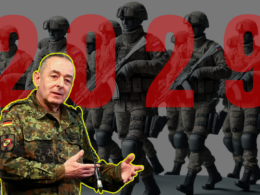Giorgia Meloni’s “Brothers of Italy” party confidently lead the extraordinary parliamentary elections in Italy. According to analysts, the probability that she will head the government is 90%. The new Margaret Thatcher for Italy. What should be expected from her? Who is Giorgia Meloni for real?
Meloni was born in 1977 in Rome and spent her childhood in the poor Roman quarter of Garbatella. Her father, a tax adviser, left the family when Meloni was 11.
There are some doubts about her linguistic education, which was mentioned in her CV
Institute, named after M. Amerigo Vespucci, is a technical educational institution, namely the institute of hotel services and the “higher Linguistic School” mentioned in Meloni’s CV, at the time did not exist. That information about linguistic education is not accurate. All of these accusations Meloni rejects: “Should I be ashamed that I have decided to take a language course in the institute of hotel services because at that time there was no other way to study foreign languages at the state school?” So it is not true that Meloni attended a linguistic school, as she argued, but studied in the higher technical institute in the linguistic direction.
Information about Meloni’s connection with Roberto Jonghi Lavarini, also known as “Black Baron,” the “Fare Fronte” leader, was published in the media. Meloni tries to distance herself from this person as much as possible.
In 1992, at the age of 15, Meloni began her political activities in the “Young Front”, the youth wing “Movimento Sociale Italiano – Destra Nazionale” (“Italian Social Movement – National Law”). MSI is a neo-fascist organization; later, a national-conservative political party in Italy was formed in 1946 by supporters of the last dictator Benito Mussolini (the share of National Law was added after joining 1972 moderate conservatives).
The party was dissolved in 1995 by Gianfranco Fini, who also created the party, the National Alliance (Alleanza Nazionale). On March 22, 2009, Gianfranco Fini announced the dissolution OF “ON” and its merger with the party “Forward, Italy” (capital. Forza Italia) Prime Minister Silvio Berlusconi.
In 1992 Meloni founded the student association “ancestors/ancient” (Gli Antenati), which took part in protests against the educational reform of Minister Roza Ruse Yervolina.
In 1996 Meloni was elected national leader of Azione Students, the student movement of the National Alliance.
In 1998 she was elected to the Council of the Rome province, where she worked until 2002. In 2001, Gianfranco Fini appointed Meloni as coordinator of the National Steering Committee of Youth Organization of the Party “Youth Action” (Azione Giovani).
During these years, Meloni also had time to work as a nanny (Rosario Fiorello – showman), an office manager, and a bartender in the Piper Club (one of the most famous nightclubs in Rome).
In 2006, she was elected a member of the National Alliance’s Chamber of Deputies and worked as Deputy Chairman of the House of Parliament, the youngest person in Italy appointed to this post. During the general elections in 2008, she received a mandate from the people of freedom (party Berlusconi).
In August 2008, Meloni offered Italian athletes to boycott the opening ceremony of the Olympic Games in Beijing as a sign of disagreement with China’s policy on Tibet; Berlusconi and Foreign Minister Franco Frattini criticized this statement.
In December 2012, Meloni, Ignazio La Russa, and Guido Kroto founded the party “the brothers of Italy — the National Alliance” (from December 3, 2017 – the brothers of Italy). The party’s ideology is national conservatism, nationalism, social conservatism, and Euro-skepticism.
Meloni’s program largely coincides with the League’s (Salvini) program, namely, immigration: They support closed borders and maritime blockades to reduce the number of illegal immigrants trying to get to the country by sea. But this is the central theme in the program Salvini, while Meloni emphasizes “Christian values”– it is her essential theme.
Meloni also has differences from Salvini regarding recognizing Jerusalem as Israel’s capital. Salvini promised to recognize Jerusalem as the Israeli capital in case of victory in the September elections, but Meloni still does not express support for this issue.
Meloni’s message is “the so-called traditional family, not the LGBT supporters,” which resonates with the mood of the Italian society, which is Catholic in its majority. Meloni tries to avoid entering into polemics with Pope, considering his authority among the Italians.
Unlike Salvini, Meloni declares their pro-Western, pro-NATO views.
The observers point out that Meloni took into account the errors of Salvini and built a reputation as a politician who had no aim to destabilize Italy’s position in NATO and the EU. She also supports Ukraine. Meloni took a pro-market side, promising to cut taxes and stop the social assistance program for the unemployed and the working poor.
It is possible to say that Meloni defends the ethnocentric policy of “non-liberal democracy”, which is based on the theory of “great substitution”, cultural Christianity, and hatred for diversity, which was initiated by Viktor Orbán (a close ally of Melon) in Hungary. Meloni had quite similar rhetoric to Orbán’s after he came to power.
It can be said that Meloni showed herself as a far-sighted and clever politician. She did not enter into an open confrontation with Enrico Letta (the head of the democratic party, according to the latest polls, second by popularity party in Italy). Despite her former Putin’s fascination, she even supported Draghi’s decision to supply arms to Ukraine. Of course, it pushes away her populist allies but, at the same time, attracts moderate voters. More intelligent than Salvini, she did everything to avoid compromising ties with Russia and China.








